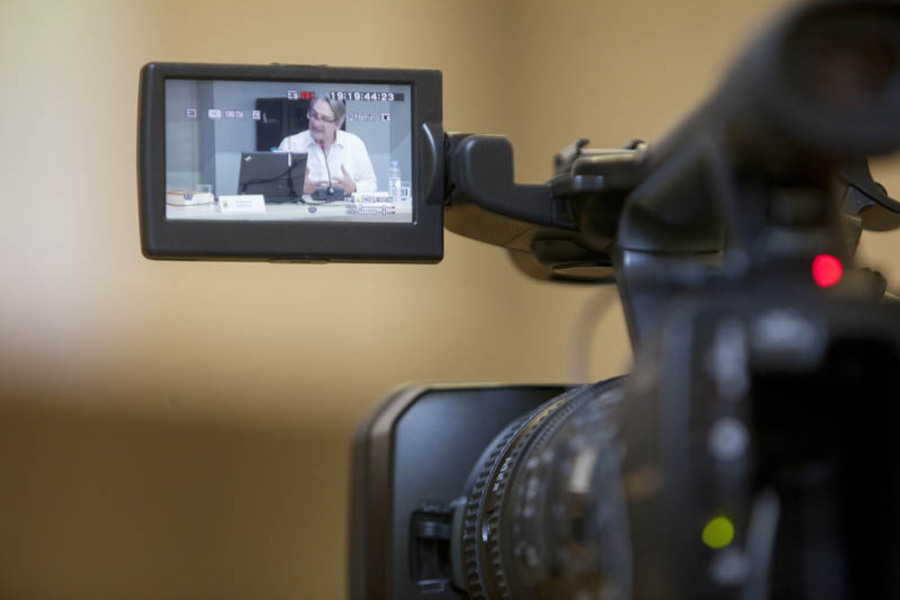Conferences and debates
Index / Activities / Conferences and debates / The media and transition in the Middle East
The media and transition in the Middle East
March 06, 20159:30 a.m.
MADRID
Casa Árabe Ambassadors’ Hall (at Calle Alcalá, 62, First Floor).
9:30 a.m.
You must register in advance to attend.
In order to sign up, you must send an e-mail message to: confirmaciones@casaarabe.es.
In English, with no translation.
A conference by Ayman Mhanna, executive director of the Samir Kassir Foundation
Four ownership models characterize the media world in the Middle East: state ownership (Egypt, Syria and many of the large pan-Arab groups), under state control (Jordan is one clear example), ownership by political parties and/or prominent political leaders (as is the case in Lebanon), or they belong to businesspeople with strong ties to the government, with even stronger political agendas (as has been seen in Egypt and Tunisia after 2011). Within this state of affairs, the media do not have enough freedom to question the past or to make civil servants accountable so that these societies can accept the darkest times in their history.
However, some journalists have attempted to contribute professionally to a stronger understanding of recent history, through special documentaries (such as Al-Jazeera’s series on the Lebanese civil war, or a documentary series by NBN on Lebanese political parties), or by focusing on events and historical personages (one recent example was RAWI’s production on Yasser Arafat), as well as some well-known talk shows (Al-Mash’had by BBC Arabic and several other interview programs on Al-Jazeera and Al-Arabiya). These efforts have made it possible to identify features of success and failure in the media’s discussion of history.
The conference will deal with these topics and, last of all, will analyze how the current coverage of the conflict in Syria by both conventional channels and new media may contribute to a successful post-conflict transition. Special emphasis will be placed on the debate surrounding the coverage of very graphic acts of violence by the self-named Islamic State and the responses which are being studied (ethical considerations, blockade, counter-narratives).
Ayman Mhanna
Mhanna is the executive director of the Samir Kassir Foundation, the headquarters of which is located in Beirut. Through its SKeyes Center for Media and Freedom of Culture, the foundation monitors violations of freedom of the press and cultural freedom in Lebanon, Syria, Jordan and Palestine, and provides support and legal assistance to persecuted journalists. Mhanna has a university degree in Economics from Saint Joseph University in Beirut and a Master’s degree in International Affairs from Sciences Po, Paris. Mhanna is also a post-graduate professor at Saint Joseph University’s School of Economics. Before founding the Samir Kassir Foundation, Mhanna worked for the National Democratic Institute for International Affairs, supervising missions for observation of local and international elections and initiatives for monitoring political processes. He has provided skills to the workers of political parties and civil society activists so that they can use the tools of e-democracy, strategic communications and promotional plans in Lebanon, Jordan, Egypt, Turkey, Germany, the United Kingdom and Togo.
However, some journalists have attempted to contribute professionally to a stronger understanding of recent history, through special documentaries (such as Al-Jazeera’s series on the Lebanese civil war, or a documentary series by NBN on Lebanese political parties), or by focusing on events and historical personages (one recent example was RAWI’s production on Yasser Arafat), as well as some well-known talk shows (Al-Mash’had by BBC Arabic and several other interview programs on Al-Jazeera and Al-Arabiya). These efforts have made it possible to identify features of success and failure in the media’s discussion of history.
The conference will deal with these topics and, last of all, will analyze how the current coverage of the conflict in Syria by both conventional channels and new media may contribute to a successful post-conflict transition. Special emphasis will be placed on the debate surrounding the coverage of very graphic acts of violence by the self-named Islamic State and the responses which are being studied (ethical considerations, blockade, counter-narratives).
Ayman Mhanna
Mhanna is the executive director of the Samir Kassir Foundation, the headquarters of which is located in Beirut. Through its SKeyes Center for Media and Freedom of Culture, the foundation monitors violations of freedom of the press and cultural freedom in Lebanon, Syria, Jordan and Palestine, and provides support and legal assistance to persecuted journalists. Mhanna has a university degree in Economics from Saint Joseph University in Beirut and a Master’s degree in International Affairs from Sciences Po, Paris. Mhanna is also a post-graduate professor at Saint Joseph University’s School of Economics. Before founding the Samir Kassir Foundation, Mhanna worked for the National Democratic Institute for International Affairs, supervising missions for observation of local and international elections and initiatives for monitoring political processes. He has provided skills to the workers of political parties and civil society activists so that they can use the tools of e-democracy, strategic communications and promotional plans in Lebanon, Jordan, Egypt, Turkey, Germany, the United Kingdom and Togo.

